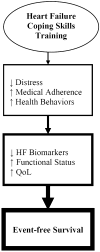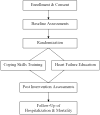Coping effectively with heart failure (COPE-HF): design and rationale of a telephone-based coping skills intervention
- PMID: 21362527
- PMCID: PMC3073538
- DOI: 10.1016/j.cardfail.2010.11.001
Coping effectively with heart failure (COPE-HF): design and rationale of a telephone-based coping skills intervention
Abstract
Background: Coping Effectively with Heart Failure (COPE-HF) is an ongoing randomized clinical trial funded by the National Institutes of Health to evaluate if a coping skills training (CST) intervention will result in improved health status and quality of life as well as reduced mortality and hospitalizations compared with a heart failure education (HFE) intervention.
Methods and results: Two hundred heart failure (HF) patients recruited from the Duke University Medical Center and the University of North Carolina Hospital system will be randomized to a CST intervention (16 weekly 30-minute telephone counseling sessions including motivational interviewing and individually tailored cognitive behavioral therapy) or to an HFE intervention (16 weekly 30-minute telephone sessions including education and symptom monitoring). Primary outcomes will include postintervention effects on HF biomarkers (B-type natriuretic peptide, ejection fraction) and quality of life, as well as long-term clinical outcomes (hospitalizations and death). Secondary analyses will include an evaluation of treatment effects across subpopulations, and potential mechanisms by which CST may improve clinical outcomes.
Conclusions: COPE-HF is a proof-of-concept study that should provide important insights into the health benefits of a CST intervention designed to enhance HF self-management, improve health behaviors, and reduce psychologic distress.
Trial registration: ClinicalTrials.gov NCT00873418.
Copyright © 2011 Elsevier Inc. All rights reserved.
Figures
References
-
- Lloyd-Jones D, Adams RJ, Brown TM, Carnethon M, Dai S, De Simone G, et al. Heart disease and stroke statistics--2010 update: a report from the American Heart Association. Circulation. 2010;121:e46–e215. - PubMed
-
- Rosamond W, Flegal K, Friday G, Furie K, Go A, Greenlund K, et al. Heart disease and stroke statistics--2007 update: a report from the American Heart Association statistics committee and stroke statistics subcommittee. Circulation. 2007;115:e69–171. - PubMed
-
- Delgado-Passler P, McCaffrey R. The influences of postdischarge management by nurse practitioners on hospital readmission for heart failure. J Am Acad Nurse Pract. 2006;18:154–60. - PubMed
-
- Barnes S, Gott M, Payne S, Parker C, Seamark D, Gariballa S, et al. Prevalence of symptoms in a community-based sample of heart failure patients. J Pain Symptom Manage. 2006;32:208–16. - PubMed
-
- Rutledge T, Reis VA, Linke SE, Greenberg BH, Mills PJ. Depression in heart failure a meta-analytic review of prevalence, intervention effects, and associations with clinical outcomes. J Am Coll Cardiol. 2006;48:1527–37. - PubMed
Publication types
MeSH terms
Associated data
Grants and funding
LinkOut - more resources
Full Text Sources
Medical
Research Materials
Miscellaneous



